Seven essential oils can effectively soothe your anxious mind: lavender, bergamot, chamomile, ylang-ylang, frankincense, vetiver, and clary sage. These natural remedies offer unique calming properties to help reduce stress and promote relaxation. Lavender is nature's tranquilizer, while bergamot uplifts your mood. Chamomile provides gentle relief, and ylang-ylang offers tropical tranquility. Frankincense grounds your emotions, vetiver anchors racing thoughts, and clary sage enhances your mood. You can use these oils in diffusers, baths, or for topical application. By incorporating these soothing scents into your daily routine, you'll discover a world of natural anxiety relief.
Lavender: Nature's Calming Agent
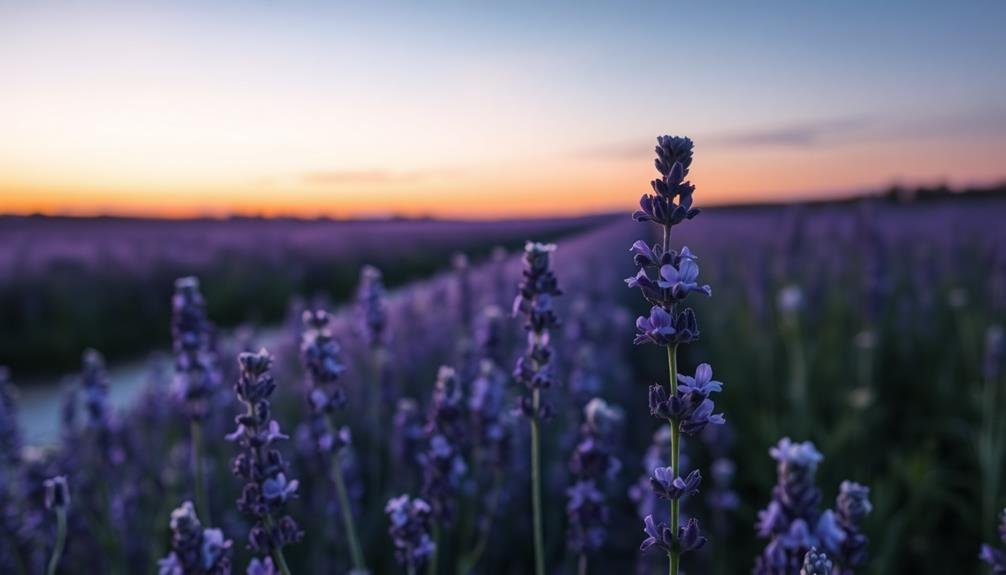
Lavender consistently tops the list of essential oils for anxiety relief. This versatile oil has been used for centuries to promote relaxation and reduce stress. Its calming properties stem from linalool, a compound that interacts with neurotransmitters in your brain to induce a sense of tranquility.
You can incorporate lavender oil into your daily routine in several ways. Try adding a few drops to your bath water for a soothing soak, or use a diffuser to fill your room with its calming scent. For on-the-go anxiety relief, dab a drop on your wrists or temples, or keep a lavender-scented sachet in your pocket or purse.
Research supports lavender's effectiveness in managing anxiety. Studies have shown that it can lower heart rate and blood pressure, reducing physical symptoms of stress. It's also been found to improve sleep quality, which is vital for maintaining overall mental health.
When purchasing lavender oil, opt for pure, high-quality products to guarantee maximum benefits. Always dilute the oil before applying it directly to your skin, and consult with a healthcare professional if you have any concerns about using essential oils.
Bergamot: Citrusy Stress Reducer
If you're looking for a citrusy twist on anxiety relief, bergamot essential oil might be your perfect match. This fragrant oil, derived from the peel of the bergamot orange, offers a unique blend of calming and uplifting properties. Its fresh, sweet aroma can help reduce stress and improve your mood.
You'll find bergamot particularly effective in easing tension and promoting relaxation. It's known to lower cortisol levels, the hormone associated with stress, and can help balance your nervous system.
When diffused, bergamot creates a soothing atmosphere that encourages mental clarity and emotional stability.
To use bergamot oil, add a few drops to your diffuser or mix it with a carrier oil for a relaxing massage. You can also inhale it directly from the bottle or apply a diluted version to your wrists and temples.
For a calming bedtime routine, try adding a drop or two to your pillow.
Chamomile: Soothing Floral Relief
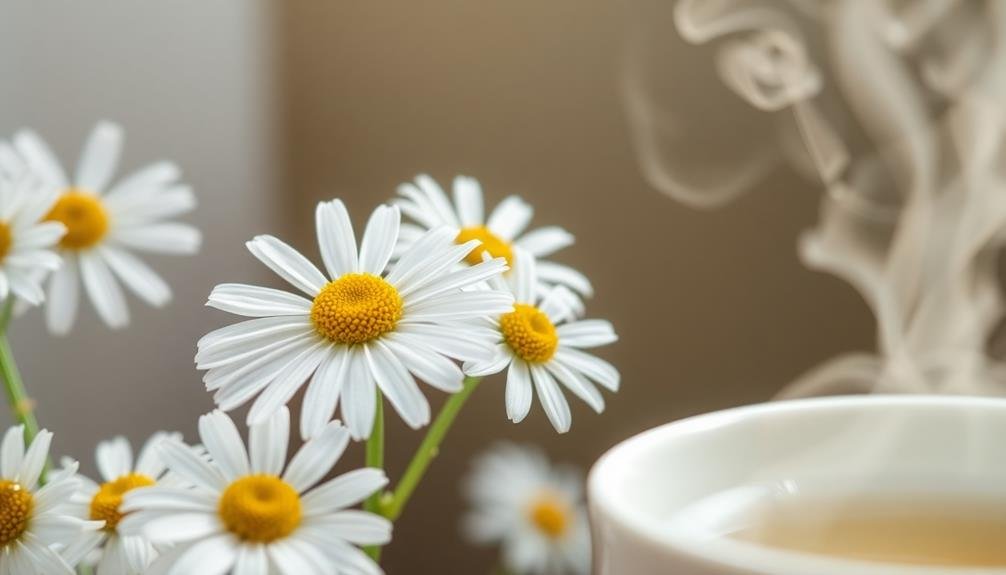
Chamomile essential oil stands out as a gentle yet powerful ally in the fight against anxiety. Its sweet, floral aroma can quickly transport you to a state of calm, making it an excellent choice for those moments when stress threatens to overwhelm you.
You'll find two main types of chamomile essential oil: Roman and German. Both offer similar benefits, but Roman chamomile is often preferred for its milder scent.
To use chamomile oil, you can add a few drops to a diffuser, inhale it directly from the bottle, or mix it with a carrier oil for a soothing massage. You might also consider adding it to your bathwater for a relaxing soak.
The oil's compounds work to reduce stress hormones in your body, promoting a sense of peace and tranquility.
Chamomile's anxiety-reducing effects aren't just anecdotal. Studies have shown its effectiveness in decreasing symptoms of generalized anxiety disorder. It's also known for its ability to improve sleep quality, which can further help manage anxiety.
Ylang-Ylang: Tropical Tranquility
You'll find the floral aroma of ylang-ylang essential oil instantly transports you to a tropical paradise.
Its sweet, exotic scent can help calm your nerves and reduce feelings of anxiety.
Ylang-ylang's stress-reducing properties make it an excellent choice for promoting relaxation and emotional balance during times of tension.
Floral Aroma Benefits
Among the floral essential oils renowned for their calming properties, ylang-ylang stands out as a tropical treasure. This fragrant oil, derived from the flowers of the Cananga tree, offers a sweet, exotic scent that's both uplifting and soothing. When you're feeling anxious or stressed, ylang-ylang can help you relax and find your center.
The floral aroma benefits of ylang-ylang extend beyond its pleasant scent. Here's how this essential oil can help ease your anxious mind:
- Reduces stress hormones: Ylang-ylang has been shown to lower cortisol levels, helping to alleviate stress and promote relaxation.
- Improves mood: Its sweet, floral scent can boost your mood and reduce feelings of anxiety and depression.
- Lowers blood pressure: Regular use of ylang-ylang may help decrease high blood pressure, a common physical symptom of stress and anxiety.
You can enjoy the benefits of ylang-ylang by adding a few drops to a diffuser, incorporating it into a massage oil, or simply inhaling it directly from the bottle.
As with any essential oil, it's important to use ylang-ylang safely and in moderation to maximize its anxiety-reducing effects.
Stress-Reducing Properties
Ylang-ylang's stress-reducing properties make it a powerhouse for combating anxiety. This tropical flower's essential oil can help you achieve a state of calm and relaxation, making it an excellent choice for those struggling with stress and tension.
When you inhale ylang-ylang's sweet, floral scent, it stimulates your brain to release feel-good chemicals like serotonin and dopamine, promoting a sense of well-being and contentment.
You'll find that ylang-ylang can effectively lower your blood pressure and heart rate, two physical indicators of stress. By incorporating this essential oil into your daily routine, you're giving your body and mind the tools to cope with anxiety-inducing situations more effectively.
Whether you choose to diffuse it, add it to a bath, or apply it topically in a carrier oil, ylang-ylang can help you unwind and destress.
Regular use of ylang-ylang essential oil may also improve your sleep quality, reduce feelings of frustration, and boost your overall mood. Its ability to balance your emotions and promote relaxation makes it an invaluable ally in your quest for inner peace and tranquility.
Frankincense: Ancient Anxiety Antidote
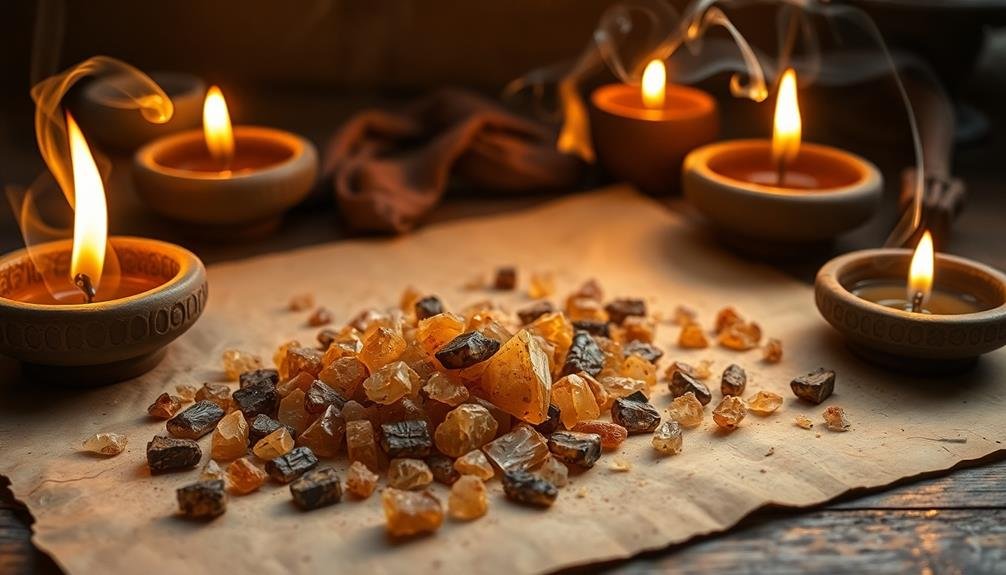
Frankincense, an aromatic resin with a rich history, has been prized for millennia as a natural remedy for anxiety. This ancient oil, derived from the Boswellia tree, offers a calming and grounding effect that can help ease your worries and promote relaxation.
When you're feeling overwhelmed, turn to frankincense for its ability to slow down rapid breathing and reduce heart rate, allowing you to regain control of your emotions.
To incorporate frankincense into your anxiety management routine, try these methods:
- Diffuse 3-4 drops in an essential oil diffuser to create a serene atmosphere
- Add a few drops to a warm bath for a soothing soak
- Mix with a carrier oil and apply to your temples or wrists for on-the-go relief
Frankincense's anxiety-reducing properties are attributed to its primary compounds, including alpha-pinene and limonene. These components interact with your brain's limbic system, helping to regulate emotions and promote feelings of peace.
You'll find that regular use of frankincense can lead to improved sleep quality, reduced stress levels, and an overall sense of calm in your daily life.
Vetiver: Grounding Earth Essence
Often overlooked, vetiver essential oil offers a potent grounding effect that can help anchor your emotions during times of anxiety. This earthy, smoky-scented oil is derived from the roots of a grass native to India and has been used for centuries in traditional medicine practices.
Vetiver's rich, complex aroma can help calm your racing thoughts and promote a sense of stability. When you're feeling overwhelmed, try diffusing vetiver oil or applying it topically to your wrists and neck. Its slow-evaporating nature means the scent lingers, providing extended relief from anxious feelings.
You'll find vetiver particularly useful for improving sleep quality, as it can help quiet your mind and prepare you for rest. It's also effective in reducing stress-related tension, making it an excellent choice for massage blends.
To incorporate vetiver into your anxiety management routine, consider blending it with other calming oils like lavender or chamomile. You can also add a few drops to your bathwater for a deeply relaxing soak.
Clary Sage: Euphoric Mood Enhancer
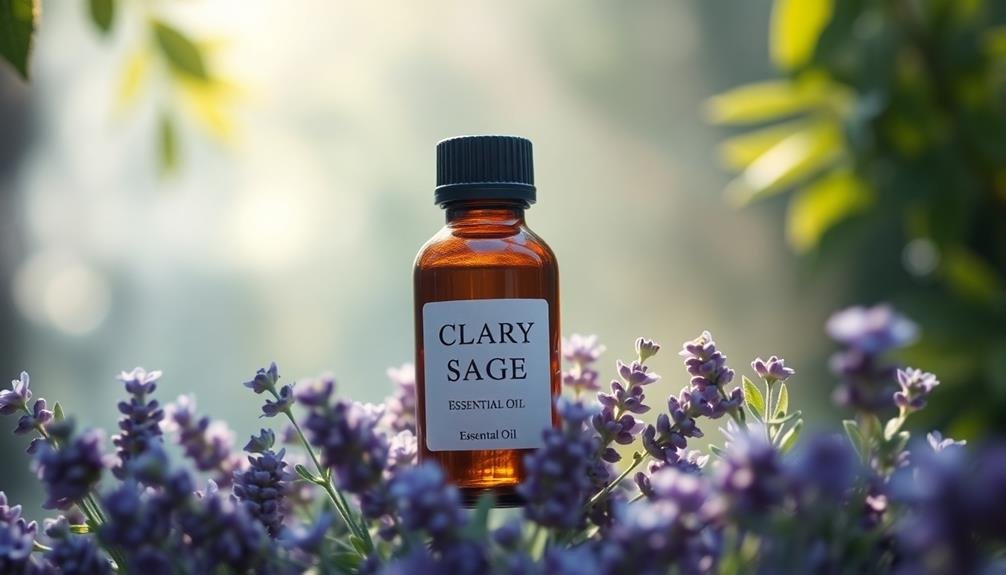
Clary sage can help calm your nervous system, easing anxiety and promoting relaxation.
You'll find it particularly useful for balancing hormonal fluctuations, which can contribute to mood swings and stress.
When used in aromatherapy, clary sage's euphoric properties can lift your spirits and provide relief from everyday tensions.
Calming Nervous System Effects
Among the various essential oils known for their calming properties, clary sage stands out as a powerful mood enhancer. Its ability to soothe your nervous system is remarkable, offering relief from anxiety and stress. When you inhale clary sage's sweet, herbal aroma, it triggers a cascade of calming effects throughout your body.
Clary sage interacts with your nervous system in several ways:
- Reduces cortisol levels: It helps lower the production of this stress hormone, promoting a sense of relaxation and ease.
- Boosts serotonin: By increasing serotonin levels, clary sage can improve your mood and overall emotional well-being.
- Regulates neurotransmitters: It helps balance brain chemistry, leading to reduced anxiety and improved mental clarity.
You'll find that using clary sage can help you feel more grounded and centered. It's particularly effective during times of high stress or when you're feeling overwhelmed.
Balancing Hormonal Fluctuations
Your hormones play an essential role in regulating mood and emotions, and clary sage can help maintain this delicate balance. This powerful essential oil has been shown to reduce cortisol levels, the stress hormone that can contribute to anxiety and mood swings. By inhaling clary sage or applying it topically, you're supporting your endocrine system and promoting hormonal equilibrium.
Clary sage is particularly beneficial for women experiencing hormonal fluctuations during menstruation, pregnancy, or menopause. It can alleviate symptoms like irritability, mood swings, and emotional instability. The oil's natural phytoestrogens may help regulate estrogen levels, which can positively impact your overall well-being.
When you're feeling overwhelmed or emotionally unsteady, reach for clary sage. Its sweet, herbaceous aroma can quickly uplift your mood and instill a sense of calm. You can add a few drops to a diffuser, mix it with a carrier oil for a soothing massage, or simply inhale it directly from the bottle.
Stress-Relieving Aromatherapy Applications
When it comes to stress-relieving aromatherapy applications, clary sage stands out as a euphoric mood enhancer. This essential oil is known for its ability to promote feelings of well-being and relaxation, making it an excellent choice for those seeking natural anxiety relief.
You'll find that clary sage can be used in various ways to harness its calming properties. To incorporate clary sage into your stress-relief routine, try these methods:
- Add a few drops to a diffuser and let the soothing aroma fill your space.
- Mix with a carrier oil for a relaxing massage blend.
- Place a drop on your pillow before bed to promote restful sleep.
Clary sage works by interacting with your body's dopamine system, potentially boosting feelings of pleasure and contentment. It's also been shown to reduce cortisol levels, the hormone associated with stress.
You'll likely notice a sense of calm washing over you as you inhale its sweet, herbaceous scent. Remember, consistency is key when using aromatherapy for stress relief, so make clary sage a regular part of your self-care routine for best results.
Frequently Asked Questions
How Long Do the Effects of Essential Oils Typically Last?
You'll typically experience the effects of essential oils for 2-6 hours. However, it can vary depending on the oil type, application method, and your individual body chemistry. Reapplication may be necessary for prolonged benefits.
Can Essential Oils Be Used Alongside Anxiety Medications?
You can use essential oils alongside anxiety medications, but it's vital to consult your doctor first. They'll advise you on potential interactions and help you create a safe, effective treatment plan combining both approaches.
Are There Any Potential Side Effects of Using Essential Oils?
Yes, you can experience side effects when using essential oils. They might cause skin irritation, allergic reactions, or headaches. If you're pregnant or have health conditions, you should be extra cautious. Always dilute oils before use.
What's the Best Method for Applying Essential Oils for Anxiety Relief?
You can apply essential oils for anxiety relief through diffusion, topical application, or inhalation. Try adding a few drops to a diffuser, mixing with carrier oil for skin use, or inhaling directly from the bottle when needed.
How Often Should Essential Oils Be Used for Managing Anxiety?
You can use essential oils for anxiety management daily, but don't overdo it. Start with 2-3 times a day and adjust as needed. Listen to your body and stop if you experience any adverse reactions.
In Summary
You've now discovered seven powerful essential oils to combat anxiety and promote relaxation. Whether you're diffusing them, applying them topically, or adding them to your bath, these natural remedies can help calm your mind and soothe your spirit. Remember to always use high-quality oils and dilute them properly. As you incorporate these aromatic allies into your daily routine, you'll find yourself better equipped to handle stress and cultivate inner peace.


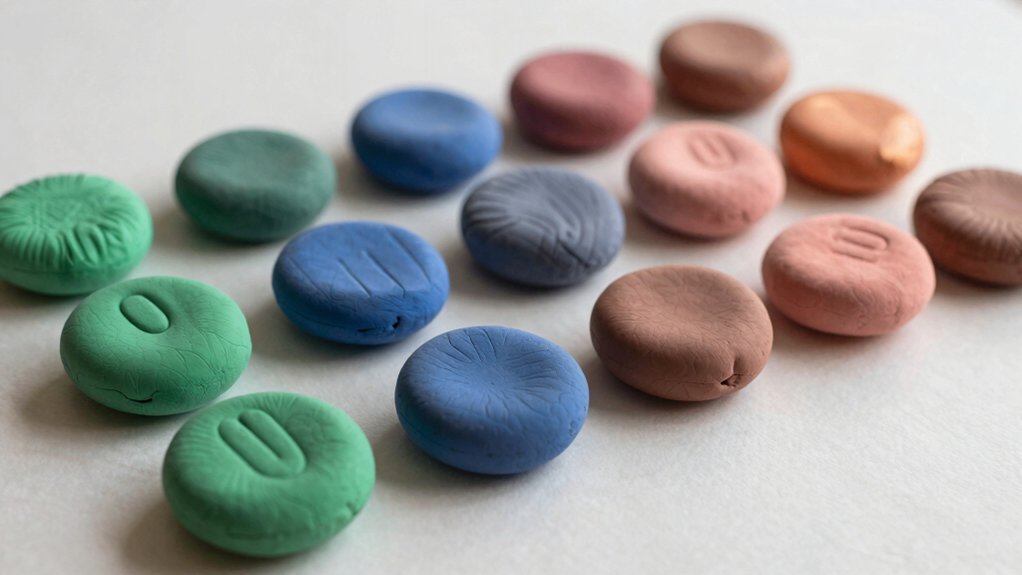

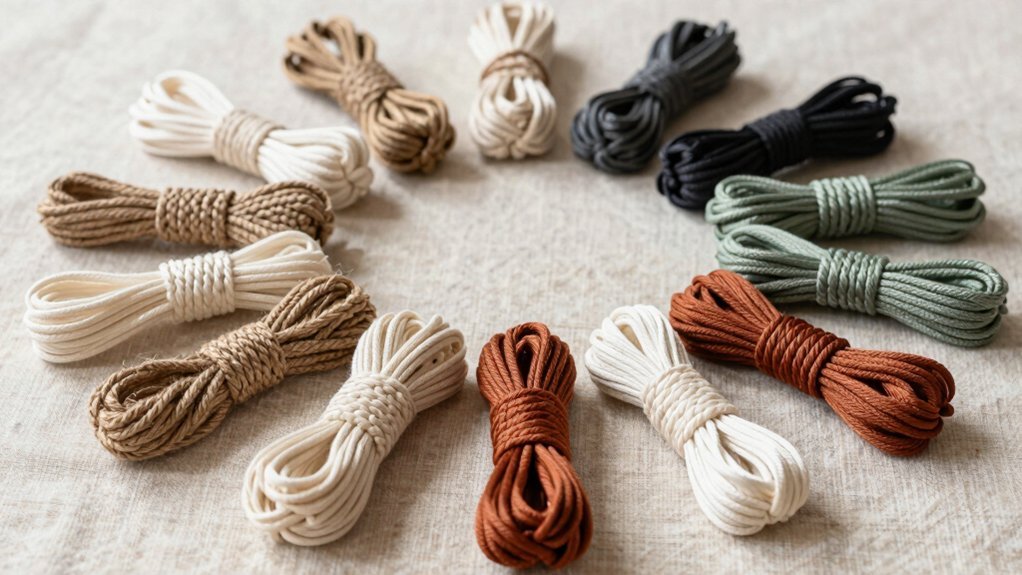
Leave a Reply